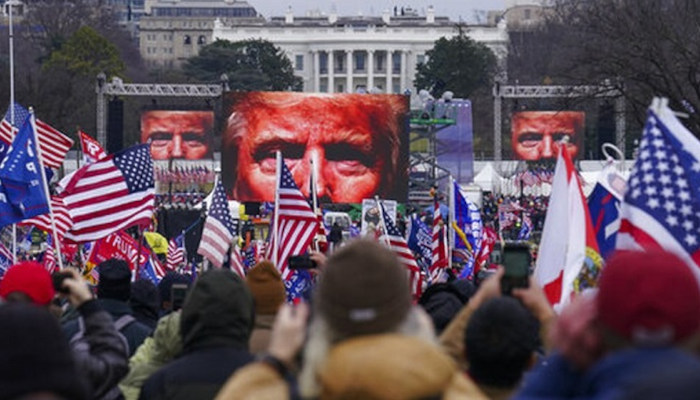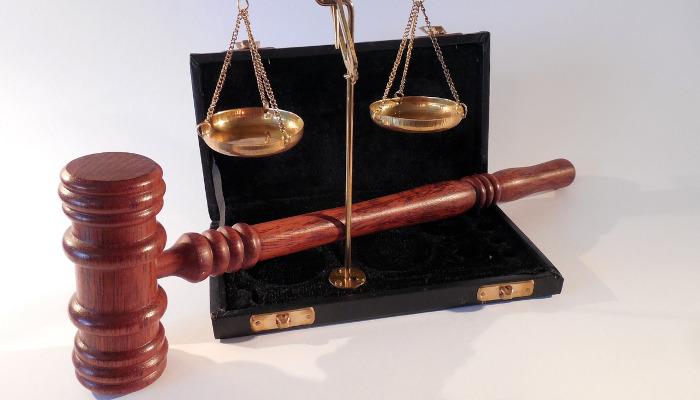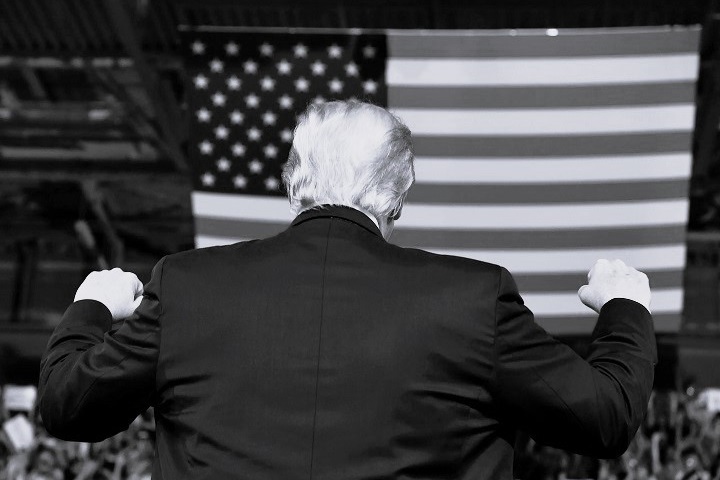
The issue of ex-president Donald Trump and his claims of a “stolen election” is no longer a mere US domestic issue with some limited impact abroad.
It must be a significant question of America’s “soft power” and legitimacy as the US main competitor; China strongly uses it to argue against Washington’s sincerity in its defense of democracy.[1]
“The US is not a straight A student when it comes to democracy. Its practice of democracy has been messy and chaotic. On January 6th, 2021, thousands of Americans gathered on Capitol Hill in Washington, D.C., and stormed the Capitol building in a bid to stop the joint session of the Congress from certifying the newly-elected president. The incident interrupted the transfer of US presidential power, leaving five dead and over 140 injured. It is the worst act of violence in Washington, D.C. since 1814 when the British troops set fire to the White House, and it sent shock waves throughout the international community. The US Senate Republican leader described it as a “failed insurrection”. A scholar from the US Council on Foreign Relations says that the US is not nearly as unique as many Americans believe, and that the Capitol riot should put an end to the notion of American exceptionalism, of an eternal shining city on a hill”.
An American expert on international issues wrote in The New York Times that while the US leader has reunited the West, he may not be able to reunite America. Trump and his supporters would be willing to depart from established constitutional rules and norms with his Big Lie.
This may undermine the ability of the US government to transfer power peacefully and legitimately. Consequently none of the institutions will work for long, and the people will be thrust into political and financial chaos.
The dysfunctional American-style democracy has triggered a trust crisis. Public commitments to the people come with behind-the-scene deals. Political infighting, money politics, and vetocracy make it virtually impossible for quality governance to be delivered as aspired by the general public. Americans are increasingly disillusioned with the US politics and pessimistic about the American-style democracy”.
In fact, Trump broke a “gentlemen’s agreement” underpinning American democracy and any democracy. The agreement is about accepting the victory or the loss in an open, fair election. Nixon in 1960 accepted his defeat by Kennedy. In the year 2000, Gore yielded to Bush in a tight election that eventually wound up before the U.S. Supreme Court.
In both cases, the outcome was disputable and could plausibly have been challenged and even reversed. But the candidate deemed to have garnered fewer Electoral College votes accepted the defeat in order to uphold the greater good of the American project, its national experiment in constitutional democracy, or the Res Publica.
By not accepting his loss even now – quite apart from the possible legal implications of the ongoing congressional special commission hearings on the January 6th event — Trump de facto undermines the very foundation of the American Republic.
This egregious political sin far outweighs any criminal activity that he may or may not have engaged in prior to and after January 6th. Perpetuating what has been called “The Big Lie” is the gravest threat to the American polity since the Civil War 160 years ago.
Even Trump’s closest allies and family members privately conceded that he lost. But whether there were irregularities that might raise legitimate questions is now beside the point. What is important is that Trump, like every other defeated presidential candidate in the nation’s history, must accept the outcome of the election.
And so it is with any candidates in a democratic election, whether at the nation, state or local level. It is imperative, if the constitutional system is to endure and command respect, that candidates come to an agreement on the ground rules, the pertinent laws, and the outcome. At the national level, for reasons rooted in America’s history and the architecture established by its Constitution, all this is complex and inherently befuddling to the non-expert.
Confuciusing America
During the prelude to the January 6th event, Vice President Pence, Attorney General Barr, Barr’s successor as Acting Attorney General and many other senior Republican office-holders declined to side with Trump’s position. They counseled that his arguments were lacking in merit and his actions were constitutionally unacceptable.
The fact that his own party members, who no doubt would have preferred to remain in power, objected to his actions underlines the radical nature of Trump’s challenge and hence the direct threat it poses to American democracy. Here one must note that confidence in the smooth and transparent functioning of American democracy supports the present global order.
In sum, then, Trump poses the single greatest threat to American credibility and the global balance of power by pushing his position, refusing to accept the outcome of the election that has passed every constitutional and legal test, and denying his support and that of his myriad followers to President Biden and his administration.
Apart from all this, there may be a different opinion on what constitutes a “fair election.” The difference in the meaning of words is found at the dawn of Chinese philosophical history. Confucius started the debate by pointing out differences between the present and traditional meaning of essential values and concepts. Some two centuries later, one of his followers, Xunzi, tried to solve the issue by proposing that the meaning of concepts must be forcibly established when in dispute.
In modern times, America has a whole set of procedures to establish the fairness of elections. Therefore, challenging the idea and practical result of “fair elections” is not to be trifled with; it is at the root of holding together a state.
This is not just an American story; it is a global one because the agreement of the two candidates on accepting the election results is just one of the many layers of the informal constitution, based on accepted norms and precedents, sustaining a delicate balance of power that the U.S. Constitution formalizes in text.
One element is the relationship between the net number of electors and the power of individual states. This balance is also about values because today under-populated states are generally more conservative, while the more populous, heavily urban ones are usually more progressive.
All of this traces back to the compromises struck to win support for the new Constitution in 1789, compromises involving the relative power of the industrialized North versus the agrarian South and, more silently, involving the issue of slavery.
Today, those who call themselves “conservatives” in the U.S. are by most definitions not “conservative” at all but quite “radical” or “revolutionary” in their agenda and their chosen means for advancing that agenda.
This in turn reflects what Americans call their “cultural wars” surrounding issues of race, gender, religion, sexual identity, education and perceived “fairness” of society. These cleavages have always simmered beneath the surface, but gained momentum in the social tumult of the 1960s, the Republican Party’s embrace of a “southern strategy” that represented a nod to whites seeking to block legally mandated entitlements for blacks, and the national laws and court decisions favoring what “conservatives” deemed a challenge to their primacy and “way of life.”
Underneath that, there is another layer yet-
America is in the middle of a massive demographic shift. African Americans and persons with Latin American ancestry are becoming the majority of the population. Whites of European descent were the majority group and the mainstay of American society for two centuries, are now becoming a minority. At the same time, America’s mainstream Catholic and Protestant churches have yielded in numbers and socio-political influence to fundamentalist and evangelical Christian denominations.
The Russian Challenge
This slow-boiling American societal mayhem was in train when Russia attacked Ukraine. Possibly the over-wily Russian president Vladimir Putin took the American crisis into account when he launched his attack on Kyiv; he may have thought that the United States would be too drawn into its internal infighting to pay much heed to external developments.
Yet, Putin miscalculated. America got involved anyway, and most importantly, Europe didn’t break up but got together and turned again to America for leadership.
In fact, there is an even wider background behind this dispute.
America no longer seems able to reach a consensus on what it seeks to be vis-à-vis the rest of the world: the lonely leader of the world, putting its interests above anyone else’s; a forger of consensus among like-minded nations through painstaking diplomatic efforts; or a neo-isolationist power in essential retreat from international obligations and entanglements.
These are competing visions of leadership. This also occurs against the backdrop of a Chinese and Asian rise, creating something different for the whole European tradition that had dominated the world for the past half-millennium.
Inability to find a domestic middle ground could tear America apart, break its leadership, and usher in a different world where many things are unknown.
Trumpists maintain that they are in mortal battle against Americans – “woke,” radical fascists, “not real” Americans — who embrace extreme policies and political measures aimed against “real Americans” … meaning Trump and his supporters. Such a view resonates to some extent with more traditional, mainstream Republicans as well.
This is creating, at least from the outside, a situation similar to what took place in Italy in the 1970s. Then the violence of the extreme left justified the violence of the extreme right and vice versa, and both indulged in fighting the existing order and destroying the state.
This fight can make or break America.
Trump and his “allies” and his enemies are blind to the dire consequences for the United States; they seem careless about the big picture and are more concentrated on their own personal survival and success. This is naively welcomed by some US enemies or competitors, as they see this as a chance for their own rise.
However, chaos in America will not necessarily end American “hegemony.” In the 2nd century BC, after the victory over Carthage, Rome began a season of civil wars which tore the republic apart for over a century. During that time, however, the power of Rome didn’t’ wane; in fact, it increased. Rome vanquished and conquered all previous Greek kingdoms around the Mediterranean and subjugated several “barbarians” at its borders.
That is, while Rome fought with itself, it also projected its tensions abroad and expanded its power or destruction, depending on how one looks at it.
The same could be valid for the United States now. If American enemies wish for American divisions to become deeper, they may not know what they wish for because it could be much easier for the new Rome, the United States, to project outward its own contradictions by seeking a new national balance and consensus through foreign assertiveness or conquest.
Still, by misjudging American weaknesses and strengths, enemies could be tempted into reckless, disruptive actions as Putin did by invading Ukraine. A future US response could be less calm and less calculated if the incumbent president is absorbed in complex internal disputes.
Res Publica Americana
Such foreign actions could backfire domestically.
If in a situation of broad tensions abroad, today Republicans don’t accept the present democratic victory, tomorrow Democrats may not acknowledge a Republican victory; then the world will be divided into Republican or Democratic supporters, which would further fuel tensions at home and abroad, like in the Roman civil wars.
Then the country and the world could be enmeshed in a virtual civil war where everybody is against everybody. So far, it has been short of a civil war because in the U.S. the armed forces and the security agencies maintain their loyalty to the Constitution and the state, not to the political parties or individual leaders.
But to maintain a modicum of domestic peace, it is not unthinkable that a future U.S. president under domestic challenge could opt for diversionary conflicts overseas.
Political acceptance of electoral outcomes should be a major political issue, not “just” a legal one. If a defeated candidate does not accept the result and challenges the results without evidence and in the face of repeated court setbacks, this person should be criminally prosecuted, whatever criminal actions he may otherwise have taken or encouraged. Whoever refuses to accept the outcome of a fair election undermines every fiber of the system and global stability.
The fact that a formal law should be passed in this regard would represent a change in the constitution and a vital element against the “gentlemen’s agreement” and the unwritten constitutional rules buttressing the formal constitution. It would be a radical change, but at least it would hamper a slide into civil war.
Then if Trump doesn’t continue to spread what has been a called “the big lie,” he should be taken out of the political process, not because he conjured whatever criminal activity, but because his activities are a political atomic bomb on the peace and stability of the United States and the world. If he changes his discourse in the next weeks and months, he will have positively contributed to the peace of the country and the world.
[1] See https://www.fmprc.gov.cn/eng/wjbxw/202206/t20220619_10706059.html









